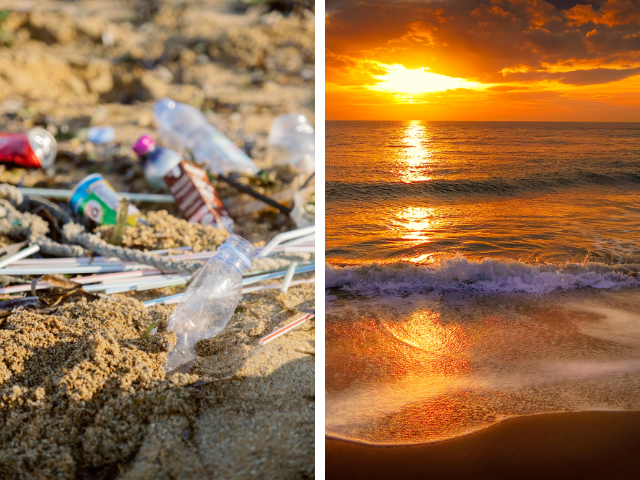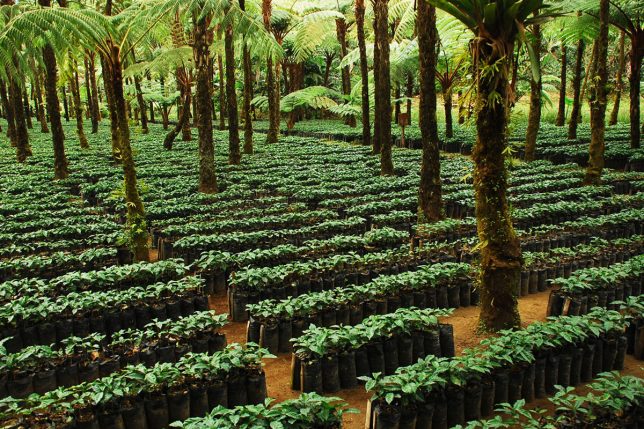
Split-screen visual with two contrasting scenes: Left Side: A sandy beach littered with plastic waste, including plastic bottles, straws, and various other trash items, emphasizing pollution and environmental degradation. Right Side: A serene and clean beach at sunset, with a golden sun reflecting on the calm waves of the ocean, symbolizing natural beauty and a sustainable, unpolluted environment. The image symbolizes the contrasts between environmental harm and the potential for a clean, thriving ecosystem.
Unmasking Climate Obstruction
Climate change is one of the most pressing issues of our time, but did you know that some of the biggest industries in the world are working together to block meaningful action? Fossil fuels, plastics, and agrichemicals are deeply connected, and they often use clever strategies to delay or deny the need for urgent climate action. These industries are obstructing progress and impacting on our planet as well as the health of ourselves and our loved ones.
Fossil Fuels and Climate Change
The Root of the Problem
Burning fossil fuels like coal, oil, and gas is the main driver of climate change. These fuels release greenhouse gases, such as carbon dioxide, into the atmosphere. These gases trap heat, causing the Earth’s temperature to rise. This leads to more extreme weather, rising sea levels, and harm to ecosystems and biodiversity.
But the problem doesn’t stop there. The fossil fuel industry is deeply connected to two other major industries: plastics and agrichemicals. Together, these industries form a powerful network that resists policies aimed at reducing fossil fuel use.
Plastics and Agrichemicals: Hidden Contributors
Plastics and Pollution
Plastics are made from fossil fuels, and their production contributes significantly to climate change. Every year, millions of tons of plastic waste end up in our oceans, harming marine life and ecosystems. Over time, plastics break down into tiny particles called microplastics, which pollute water, soil, and even the food we eat.
Agrichemicals and Their Impact
Industrial farming relies heavily on chemicals like fertilizers and pesticides, which are also made from fossil fuels. These chemicals can contaminate water sources, harm wildlife, and disrupt ecosystems. For example, pesticides can kill beneficial insects like bees, which are crucial for pollinating crops. Fertilizers can cause algal blooms in water bodies, leading to “dead zones” where marine life cannot survive.
How Industries Block Climate Action
Social Media and Misleading Messaging
Companies in these industries often use social media platforms like X to spread messages that downplay the urgency of climate action. They ignore the problem of our reliance on fossil fuels. For example, ExxonMobil has promoted carbon capture technology as a solution, but this technology is not yet widely used and doesn’t address the continued extraction of fossil fuels.
Shifting Blame to Individuals
Instead of taking responsibility, these industries often shift the blame to individuals. They might encourage people to recycle more or use less water, while ignoring their own role in creating pollution and climate change. This tactic distracts from the need for large-scale, systemic changes.
Greenwashing
Many companies engage in “greenwashing,” where they make themselves appear environmentally friendly without taking meaningful action. For instance, they might highlight small sustainability projects while continuing to expand fossil fuel production. This creates a false impression that they are part of the solution, when in reality, they are part of the problem.
Lobbying Against Change
These industries spend millions of dollars lobbying governments to resist stricter environmental regulations. They argue that such rules would hurt the economy and cost jobs, even though these regulations are essential for protecting the planet and public health.
Impact on Biodiversity and Health
Harm to Wildlife
The production and use of fossil fuels, plastics, and agrichemicals have devastating effects on biodiversity. For example:
- Plastics harm marine life, with animals like turtles and seabirds often mistaking plastic for food.
- Pesticides kill beneficial insects like bees, which are vital for pollinating crops and maintaining ecosystems.
- Fossil fuel extraction destroys habitats and contributes to deforestation, threatening endangered species.
Health Risks
These industries also pose serious risks to human health:
- Air and water pollution from fossil fuel extraction and processing can cause respiratory diseases and other health problems such as cancer.
- Chemicals from plastics and agrichemicals can contaminate drinking water and food supplies, leading to long-term health issues, including cancer.
What Can We Do?
Raise Awareness
One of the most important steps is to raise awareness about how these industries work together to block climate action. Share articles like this one, and talk to friends and family about the issue. The more people know, the harder it will be for these industries to continue their obstruction.
Support Stronger Regulations
Advocate for policies that limit fossil fuel production and promote clean energy. Contact your local representatives and let them know that you support stricter environmental regulations.
Reduce Your Reliance on Plastics and Chemicals
While individual actions alone won’t solve the problem, they can still make a difference. Reduce your use of single-use plastics, choose organic foods when possible, and support sustainable farming practices.
Hold Companies Accountable
Support organizations and campaigns that hold fossil fuel, plastic, and agrichemical companies accountable for their actions. Look for brands that are genuinely committed to sustainability and avoid those that engage in greenwashing.
Summing Up
The fossil fuel, plastics, and agrichemical industries are deeply connected and often work together to resist climate action. They use social media, lobbying, and misleading messaging to delay or deny the need for urgent action, all while continuing to harm the environment and public health. To address climate change, we need to look beyond just energy and focus on the entire petrochemical industry, including plastics and agrichemicals.
By raising awareness, supporting stronger regulations, and making sustainable choices, we can push back against these industries and work toward a healthier, more sustainable future. Together, we can unmask climate obstruction and demand real action for our planet.
Source: Kinol, A., Si, Y., Kinol, J., & Stephens, J. C. (2025). Networks of climate obstruction: Discourses of denial and delay in US fossil energy, plastic, and agrichemical industries. PLOS Climate, 4(1), Article e0000370. https://journals.plos.org/climate/article?id=10.1371/journal.pclm.0000370.

